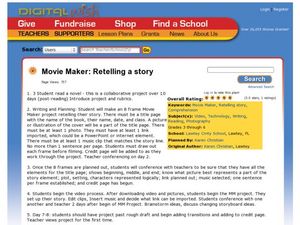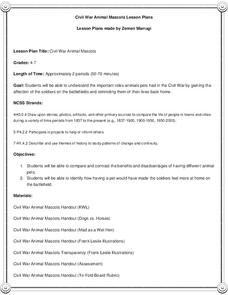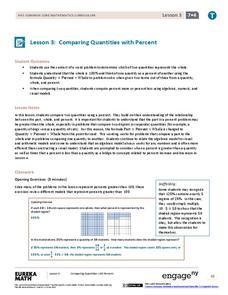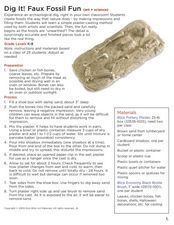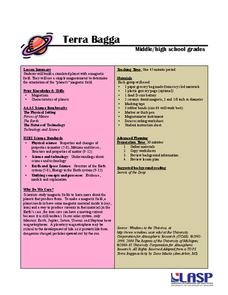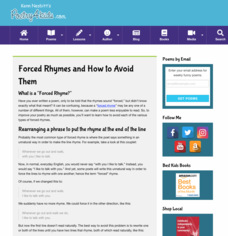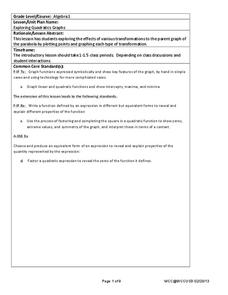EngageNY
Solution Sets to Simultaneous Equations (part 1)
How are systems related? Build on your pupils' previous knowledge of solving systems of equations by introducing systems of inequalities. Learners explore similarities between systems of equations and inequalities to make a strong...
University of Minnesota
Dendritic Spines Lab
This is your brain on drugs ... literally! Your neuroscientists-in-training examine the evidence of drug use on the human brain and how neurons change their connectivity when altered by drugs. They then work together to create testing...
NASA
The Case of the Wacky Water Cycle
Join the tree house detectives in learning about the processes of the water cycle, water conservation, water treatment, and water as a limited resource.
EngageNY
Why Do Banks Pay YOU to Provide Their Services?
How does a bank make money? That is the question at the based of a lesson plan that explores the methods banks use to calculate interest. Groups compare the linear simple interest pattern with the exponential compound interest pattern.
University of Colorado
Happy Landings: A Splash or a Splat?
Huygens spacecraft landed on Saturn's moon Titan in 2005, making it the farthest landing from Earth ever made by a spacecraft. In this hands-on activity, the 12th installment of 22, groups explore how density affects speed. To do this,...
Kansas Department for Aging and Disability Services
Leadership Activities
Implementing culture change within an existing organization begins with effective leadership. Scholars explore organizational leadership by reading and discussing case studies about nursing homes. They also write personal mission...
Missouri Department of Elementary
How We Are Alike And Different
Scholars develop social awareness by exploring the concept of similarities and differences. Learners examine two beverages and use a Venn diagram to identify similarities and differences. They tally each item to identify if they are more...
National Endowment for the Humanities
The "To Do List" of the Continental Congress
What is on your to-do list today? The second lesson of a three-part series on Lost Heroes of America investigates the laundry list of items in front of the second Continental Congress. Scholars research, analyze, and present information...
Curated OER
Movie Maker: Retelling a Story
Using Movie Maker, sixth graders make an eight frame movie based on a story they have written. They choose music clips, select pictures from PowerPoint, and make their movie. The lesson plan should take about ten days to complete.
Project B.A.S.I.C. Child Development Specialist and Child Care Consultation
Better Attitudes and Skills in Children
Little kids often have very big feelings, and need help expressing them. A set of social emotional lessons provide tangible ways for young elementary learners to visualize their emotions, focus on clear communication, and channel their...
Civil War Trust
Civil War Animal Mascots
A pet can offer comfort, friendship, and loyalty in the most stressful of situations. Here is a lesson plan that explores the important role animals played during the Civil War. Class members read informative texts, complete a KWL chart,...
Scholastic
Columbus Day/Thanksgiving Ships at Sea
Discover the meaning of Columbus Day and/or Thanksgiving by creating art from food. This activity focuses on making edible ships using easy to find food items. The class will investigate the journeys that were taken for either of these...
Curated OER
Finding Meaning in the Badge
Children who are three to five years old study two rank badges from the Qing dynasty to develop an understanding of social rank, language skills, and symbolism. The activity is discussion-based and requires learners to compare and...
C-SPAN
Polling and Public Opinion
Most people are eager to offer their opinions about topics of interest, but what's the most effective way to collect and assess these opinions as a matter of fact? High schoolers learn about the history of polling, as well as the...
EngageNY
Comparing Quantities with Percent
Be 100 percent confident who has the most and by how much. Pupils use percentages to help make the comparisons by finding what percent one quantity is of the other. They also determine the percent differences between the two quantities.
National Wildlife Federation
Yesterday: Our Energy Needs Over Time
How has our relationship to energy changed over time? An engaging exploration challenges learners to create a timeline showing human energy needs and uses over time. Scholars review what timelines are, choose a 50-year period in history...
Polar Trec
Ozone Data Comparison over the South Pole
Did you know the hole in the ozone is seasonal and filled by January every year? The lesson uses scientific measurements of the ozone over the South Pole to understand patterns. Scholars learn that the hole grew bigger annually before...
NPR
Is There Really an Immigration Line?
If you've ever looked at the US immigration system, you know that it is complex and a source of controversy. An insightful lesson plan encourages learners to conduct their own analyses of the US immigration system by asking them to...
Missouri Department of Elementary
I’m Thumbody!
Positive and negative thinking is the focus of a instructional activity that boost self-awareness. Beginning with a whole-class discussion, scholars brainstorm what positive thinking looks and sounds like then compares and contrast the...
Curated OER
Faux Fossil Fun
Elementary schoolers investigate how fossils are created by reproducing the process of creating an impression and filling it with a hardening material. The art lessons from this source are just fantastic! The lesson plan is well-written...
Carnegie Mellon University
Consumer Preferences in Lighting
What is a watt? This tongue-twisting, mind-bending question and others are answered through this activity on the different lighting options available. With the support of a PowerPoint, teach your physical science class about units of...
University of Colorado
Terra Bagga
One way to identify possible volcanic activity on other planets is by testing the planet for magnetism. A science lesson begins with pupils constructing their own planet from a dead battery, magnets, paper, and tape before labeling the...
Poetry4kids
Forced Rhymes and How to Avoid Them
Ready to take your poetry writing to the next level? Use an independent lesson to iron out all those forced rhymes, wrenched rhymes, and near rhymes from first-draft poems.
West Contra Costa Unified School District
Exploring Quadratics and Graphs
Young mathematicians first graph a series of quadratic equations, and then investigate how various parts of the equation change the graph of the function in a predictable way.










